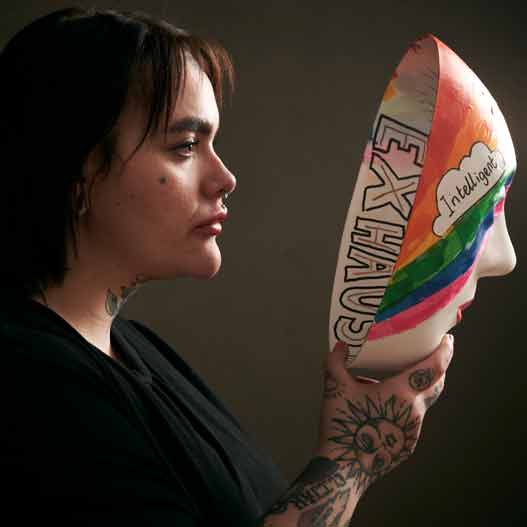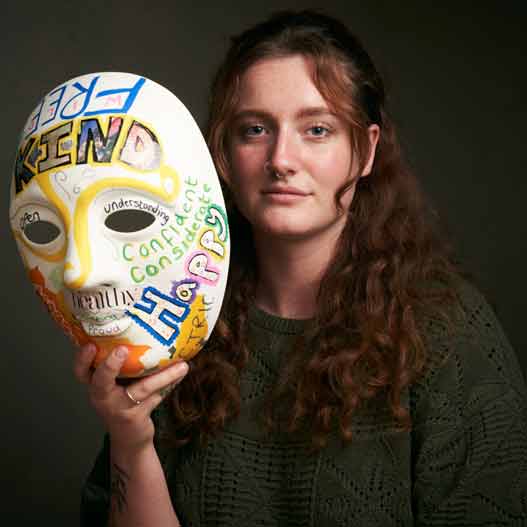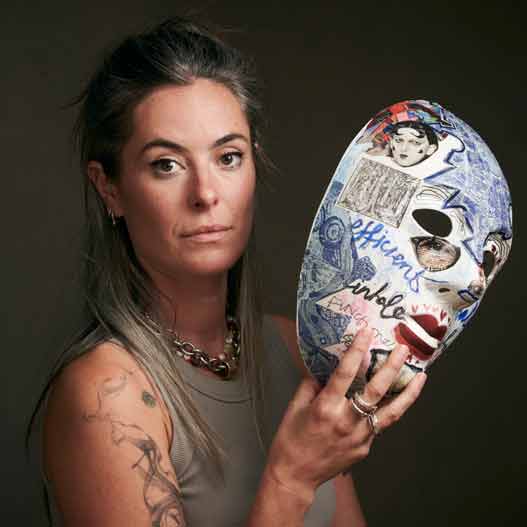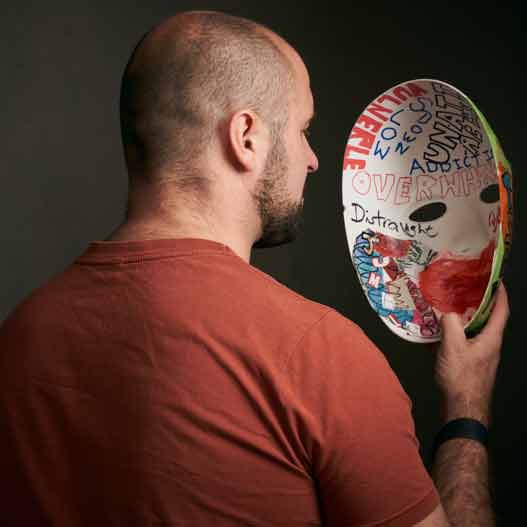If you’re struggling with the mental health impact of ADHD, you’re not alone. Three quarters of therapists reported a rise in clients seeking therapy for issues related to Attention Deficit Hyperactivity Disorder (ADHD) in the past year, according to our latest member survey.
More than half of respondents (57%) say they often see clients masking their ADHD traits to avoid stigma.
Our Unmasking ADHD through therapy campaign highlights this struggle through a series of powerful portraits. Each photograph features individuals with ADHD holding masks they’ve created, which symbolise the contrast between their public personas, and traits and feelings they tend to mask.
The images are complemented by a short film that captures the process of creating these masks and tells four people’s personal stories.
These have been shared with the media to show how qualified support from a counsellor or psychotherapist can help with the mental health impact of ADHD.
What is masking?
"People use masking in ADHD because what they often feel is that their natural behaviours are often not acceptable to the people around them," says our member Mark Redwood.
"They learn to hide, disguise, suppress or squash them down. The effort of doing this actually often leads to burnout, confusion, to disconnection."
How can therapy help if you have ADHD?
"Therapy offers a safe and supportive space to explore issues such as masking," says Mark.
It can help you cope with ADHD and explore your thoughts, feelings and behaviours. It can encourage you to think more positively and have a better understanding of yourself.
"Therapy can't fix ADHD, but it can help people build coping strategies, live more authentically, and learn to thrive with ADHD," Mark adds.
Therapy gives you a safe, non-judgmental and confidential space to talk with a skilled professional.
Read more...
Our stunning portrait photos show how therapy has unmasked people’s ADHD
Lauren
"I would often appear happy and bubbly, on the ball with tasks, when really I was struggling to keep up… My therapist helped me realise that was OK, that I had to do things differently… If I have a rough day and I’m feeling bad about myself, I look back at what my therapist has told me."

Alice
"I don’t know the person that I’d be if I hadn’t had therapy. Through going to therapy I was able to drop the mask in certain scenarios and really make me be OK with being who I am. I’m really proud of having ADHD."

Nathalie
"My experience of masking would come in the form of multiple burn outs… One of the things I’ve worked on with a therapist is releasing the shame around the way my brain works differently and the way I might have to find different ways to do things. I perhaps still end up at the same result, but perhaps in a different kind of journey to others."

James
"Masking is something that I did to feel I could fit in. It was like ‘I will put my mask on and I will be like everyone else.’ …Therapy has allowed me to look at that with more understanding and care. It’s allowed me to self-reflect and have that mirror – mirroring back and asking questions, picking up on things I didn’t even think about."

Watch the Unmasking ADHD through therapy film
Hear firsthand from Lauren, Alice, Nathalie and James about their experience of masking their ADHD and how therapy helped them.
How to find a counsellor
You may be able to see a counsellor through your GP or the NHS, from where you work or study, or through charities and voluntary services. You can also pay to see a private BACP counsellor. This gives you a wider choice, and you may be able to see someone quicker, and perhaps for longer.
Anyone can call themselves a counsellor or psychotherapist, so it’s important you choose a therapist who’s listed on a Professional Standards Authority accredited register – such as the BACP register. Choosing a BACP-registered counsellor gives you an assurance that they meet the standards of proficiency, training and ethical practice you should expect.
It’s also worth asking your counsellor what experience or training they have for working with people with ADHD.
It’s important to choose a therapist who you have a connection with and who you feel comfortable talking to.
Find a BACP member who can help you using our Therapist directory.
Find out more...

Attention deficit hyperactivity disorder (ADHD)
What is Attention Deficit Hyperactivity Disorder (ADHD)? Our member Anita Watkins explains how counselling can help with ADHD.

Square pegs and sliding doors
Laura Bradshaw talks about her work with late-diagnosed clients with ADHD. Neurodiversity Celebration Week blogs

It changed my life
‘Therapy helped me accept I am not defective'. Therapy Today, March 2024
